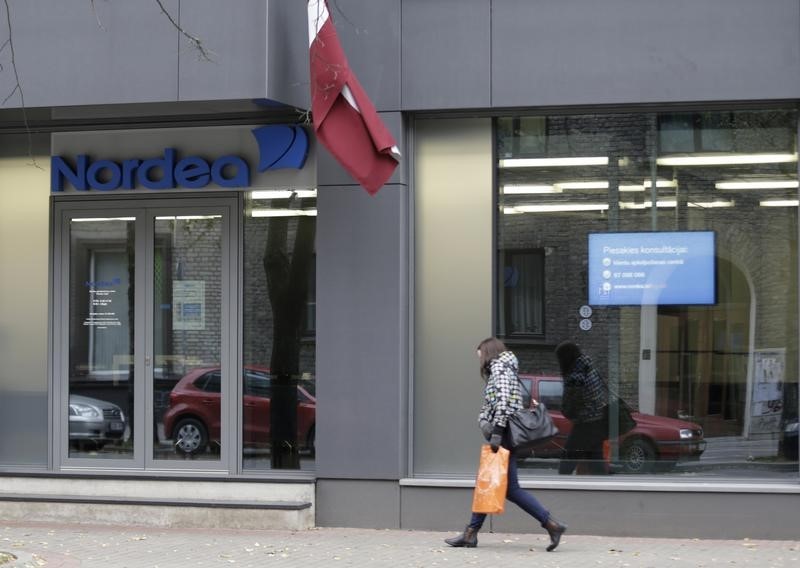By Johan Ahlander and Simon Johnson
STOCKHOLM (Reuters) - Negative interest rates and sluggish corporate loan demand due to an uncertain global economy hit earnings at three of Sweden's biggest banks, wiping nearly 40 billion Swedish crowns (3 billion pounds) off the value of their shares.
Nordea (ST:NDA), SEB (ST:SEBa) and Handelsbanken (ST:SHBa) all reported lower than expected profit for the third quarter on Wednesday blaming ultra-loose monetary policy, worries over China and challenges in their home markets.
"In a quarter such as this, it is impossible to make as much money," Nordea CEO Christian Clausen said. "You cannot compensate," he said, referring to the impact of negative interest rates.
Both Sweden and Denmark have negative rates and many analysts expecting a further cut in Sweden next week when the central bank publishes its decision on Oct. 28.
Banks already pay to deposit money with the central bank but have not passed on that cost to customers, squeezing margins and reducing net interest income.
Higher margins on mortgage lending, a bright spot for the Swedish banks, failed to completely offset the effect of the negative rates in the third quarter.
With China's economy slowing and growth in Europe still sluggish, rate increases are unlikely in the near future.
Despite their disappointing third quarter, Swedish banks are still some of the most profitable in Europe. The country's four major banks have made a combined net profit of 62 billion Swedish crowns in the first nine months this year, roughly in line with the first nine months of 2014.
But global economic uncertainty has dampened credit demand from corporate customers while market volatility has also had a negative impact on banks' trading activities.
"We have seen a clear repricing of risk, firstly by a renewed Greek crisis and then by China which has led to the sharpest rise in credit spreads on the bond market since Lehman," SEB CEO Annika Falkengren said.
"Our customers have become a lot more cautious."
Norway is struggling with an oil market downturn and the central bank cut rates in September. Finland is in recession.
In Sweden, the economy is growing, but the broad Stockholm Index (OMXSPI) fell 6 percent during the third quarter.
The weaker than expected results knocked around 39 billion Swedish crowns ($4.70 billion) off the value of the three banks on Wednesday. Handelsbanken shares led the fall, down 6.1 percent. Nordea was down around 4.1 percent and SEB around 3 percent.
"All three reports were pretty bad. Both in the respect that they missed the consensus forecast and in terms of the quality of the result," Andreas Hakansson, banking analyst at Exane BNP Paribas (PA:BNPP) said.
"It's not like Swedbank yesterday where the result was bad but the underlying quality was actually pretty good."
Analysts view net interest income, the profit banks make from lending, as stable and therefore of higher quality than income based on volatile markets and trading.
Shares in Swedbank (ST:SWEDa), which also missed consensus estimates due to lower trading income but reported net interest income above market expectations, were up marginally on Wednesday.
SEB's operating profit fell to 4.63 billion crowns, lagging a mean forecast of 4.87 billion and down from 6.67 billion a year earlier.
Nordea posted lower operating profit of 1.03 billion euros($1.17 billion) against expectations of 1.12 billion.

Handelsbanken's operating profit fell to 4.73 billion crowns, lagging a mean forecast for 5.02 billion and the 4.90 billion it achieved a year earlier.